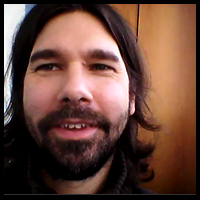Hozzászólások: 29
Nyelv: English
sergejm (Profil megtekintése) 2015. december 11. 6:17:58
The Christian God is also three-in-one.
In Esperanto you can use -aro to make the single from the plural, e.g. diaro
Vestitor (Profil megtekintése) 2015. december 11. 13:00:47
devilyoudont:Yes. I don't think that is a controversial theory though. It would not be unusual for those Hebrews to have followed the widespread traditions of other mid-East, Greek and Roman religious behaviour. Judaism still has Malqat ha Shabbat; and Tu b'Shvat (which is essentially tree worship). The idea of monotheism conflicts with the internal hstory and traditions.richardhall:That's true of some parts of the Hebrew Bible: it's a big collection of books, written over many centuries in lots of different contexts. It isn't (or shouldn't be) surprising that it offers a range of perspectives. I think we can say that by the time of the exile, the religion of Israel was fully monotheistic.I have heard a theory that the experience of the exile created a monotheistic religion out of a henotheistic one. At the very least, I believe there is evidence of worship of Asherah as Consort to Yahweh up to the exile. It is interesting to think of at least
I think it's fair to say that the developments are largely political and cultural (spread of literacy, fiddling with 'official' texts etc) and ethnic. The entire question sits atop false premises and delusions, so for me at least, it's trivia rather than fundamental.
erinja (Profil megtekintése) 2015. december 11. 15:49:32
The new year of the trees is also not really pagan or even Biblical in origin. It's the date from which we count the ages of trees, for the purpose of deciding whether fruit can be eaten from that tree. It isn't tree worship. Mystical ideas only became associated with this date when kabbalism got started, and that wasn't till the 16th century.
harlandski (Profil megtekintése) 2015. december 18. 20:08:14

Firstly to the question - should Esperanto use "la" with the (one) God. Maybe according to strict logic yes, but as always in Esperanto there seems to be a tension between strict logic and common (European) usage, and common usage - using a capital letter with no article - is followed here. Anyway "la dio" would still be ambiguous, as it could just mean "the god we happen to be talking about" rather than the one God.
Secondly about the Greek. Classical Greek does actually use the definite article to denote the one God (ho theos) as opposed to a god (theos), though "ho theos" could also mean "the god we happen to be talking about" in a polytheistic context. And while Richard Hall is right that the NT is full of departures from classical usage, this part of John 1:1 does not seem to be such a departure. In Classical Greek it's standard practice to drop the definite article for the complement of the verb to be, so the fact that "theos" doesn't have a definite article here does not seem to be a Koine Greek colloquialism. Although out of context this could mean "a god", the fact that ho theos (ton theon) is referred to in the immediately preceding phrase makes this incredibly unlikely.
From a Classical Greek perspective what seems odd about this Esperanto translation (and almost every translation from the Vulgate onwards) is the use of Vorto to translate the Greek logos. For a philosophically-minded Greek reader, logos means something like "the organising principle of the universe". And for me "the Organising Principle of the Universe was God" makes a lot more sense than "the Word was God" / "la Vorto estis Dio". Now how to translate "Organising Principle of the Universe" into Esperanto I'll leave to more competent users, but I'm sure it can be done with enough affixes

richardhall (Profil megtekintése) 2015. december 18. 23:44:11
When we get to word/vorto/logos we're departing from translation and moving to interpretation because, as you say, logos carries a weight in Greek that 'word' does not in English. Getting to grips with this sort of stuff is the bread and butter of Christian preaching, which I do Sunday after Sunday!
Alkanadi (Profil megtekintése) 2015. december 20. 16:33:55
richardhall:I'd not argue with any of that.Next time, I hope God sends a DVD instead of a book. And I hope it will be available in many languages. That way each language group can hear the message in their native language without the ambiguity.
When we get to word/vorto/logos we're departing from translation and moving to interpretation because, as you say, logos carries a weight in Greek that 'word' does not in English
richardhall (Profil megtekintése) 2015. december 20. 17:46:41
Quite like the idea of God sending a DVD, though. Wonder what the 'extras' would be like?!
Alkanadi:richardhall:I'd not argue with any of that.Next time, I hope God sends a DVD instead of a book. And I hope it will be available in many languages. That way each language group can hear the message in their native language without the ambiguity.
When we get to word/vorto/logos we're departing from translation and moving to interpretation because, as you say, logos carries a weight in Greek that 'word' does not in English
Vestitor (Profil megtekintése) 2015. december 20. 18:09:40
richardhall:Strictly speaking, Christians believe God sent a person, not a book. That's the essence of Christmas.Which makes me wonder why so much store is put in 'the book'.
keithwood57 (Profil megtekintése) 2015. december 20. 18:44:58
I agree that God sent Jesus not a book - though many strict evangelical Christians would argue that the Bible is infallible and inerrant - and therefore sent from God.
And on languages, just to very lightly add another note on this, I am a 'traditional catholic'. I prefer my liturgy in Latin, so my friend from Poland who sits near me follows it in the same Missal as do I.
Polaris (Profil megtekintése) 2015. december 21. 14:32:15
We know from the scriptures (Old and New Testament) that the world was framed by the word of God. The very next verse, in fact, says "all things that were made were made by him, and without him was not anything made that was made", so John is obviously referring to creation. God's word was used in creation, as He spoke the worlds into existence ("and God SAID, 'Let there be light'", "and God SAID, 'Let the dry land appear'", etc.). God's word is simply an aspect or a feature--not another god. Since God declared in Isaiah that he stretched forth the world by himself, it would be totally absurd to extrapolate from John 1:1 that John was saying that another god was present with God in the beginning--yet that's what would be implied if we were to add the word "a" before the word "god" in the second part of John 1:1.







